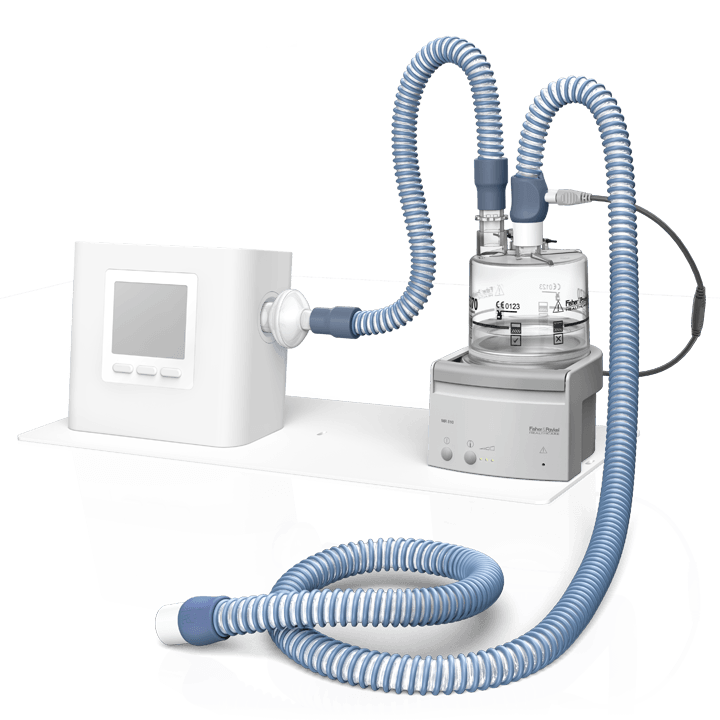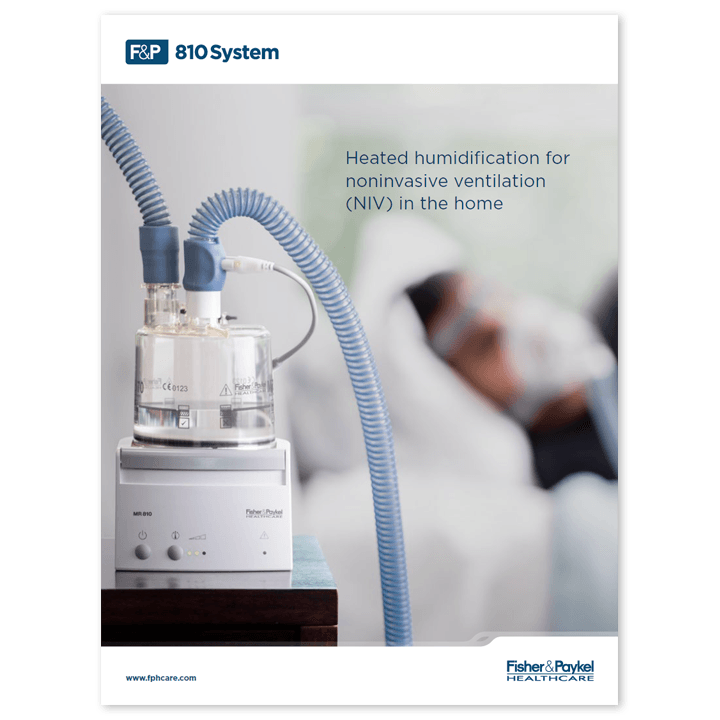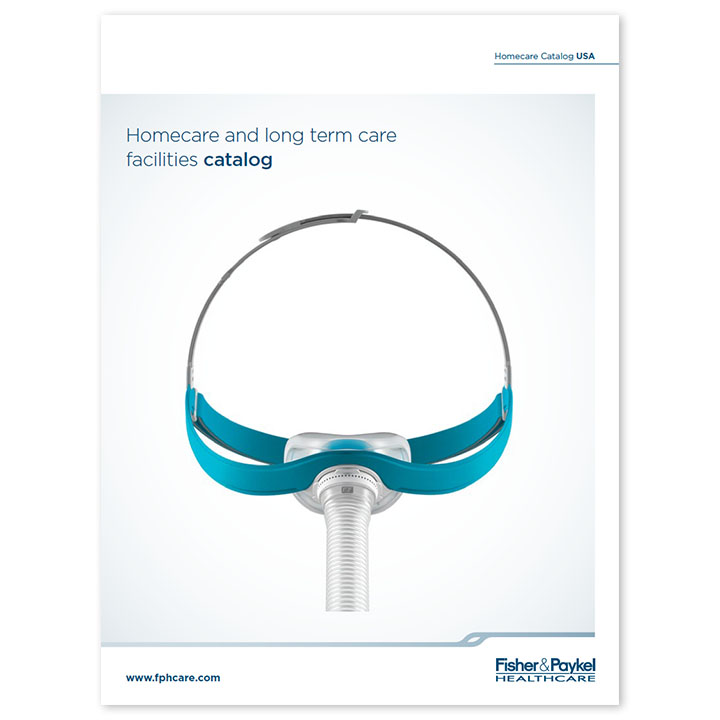Noninvasive Ventilation
Heated respiratory humidification can increase patient comfort and tolerance to noninvasive ventilation in the home.
Noninvasive ventilation (NIV) is the delivery of respiratory pressure support via a mask and may be used to treat respiratory failure, such as chronic obstructive pulmonary disease (COPD).1 A ventilator may generate positive pressure to assist with inspiration and expiration.2 The American Association for Respiratory Care (AARC) highly suggests heated humidification for NIV to improve comfort.3
Normal adult airwayThe respiratory system is a highly balanced mechanism reliant on humidity.4 As air travels down the airway during normal inspiration, heat and moisture are drawn from the airway mucosa until the gas reaches 37 °C, 44 mg H₂O/L close to the carina.5,6The airway mucosa needs to retain a balance of heat and moisture to maintain a fully functioning mucociliary transport system and act as an efficient line of defense. This process plays an important role in efficient gas exchange by maintaining clear and open airways with effective mucus clearance.6 The benefits of heated humidification for noninvasively ventilated homecare patientsIncreased comfort and tolerance to NIVThe gas leak, high flow rate and unidirectional flow of NIV therapy can dry the oral and nasal mucosa.7,8,9 Therefore, healthcare providers should make every effort to maximize patient comfort as it is critical to the tolerance of NIV therapy. Heated humidification is highly suggested for NIV therapy to improve comfort.3Assists natural defense mechanisms in the airwayPersistent airway inflammation and mucus retention are clinical issues for patients with chronic respiratory diseases. Homecare patients commonly use home ventilators and should use humidity to improve secretion clearance.10,11Promotes efficient gas exchange and ventilationSecretion clearance is fundamental to limiting airway occlusion and promoting efficient ventilation and gas exchange.12 Humidification is integral to secretion management in mechanically ventilated patients,10 and it assists with secretion mobilization and removal.3,13Insufficient respiratory humidification can result in diminished cilia activity, decreased cilia beat frequency, ciliary destruction and cellular damage. The resulting increase in mucus viscosity and impaired mucociliary clearance may lead to secretion retention, airway occlusion and atelectasis.14 | 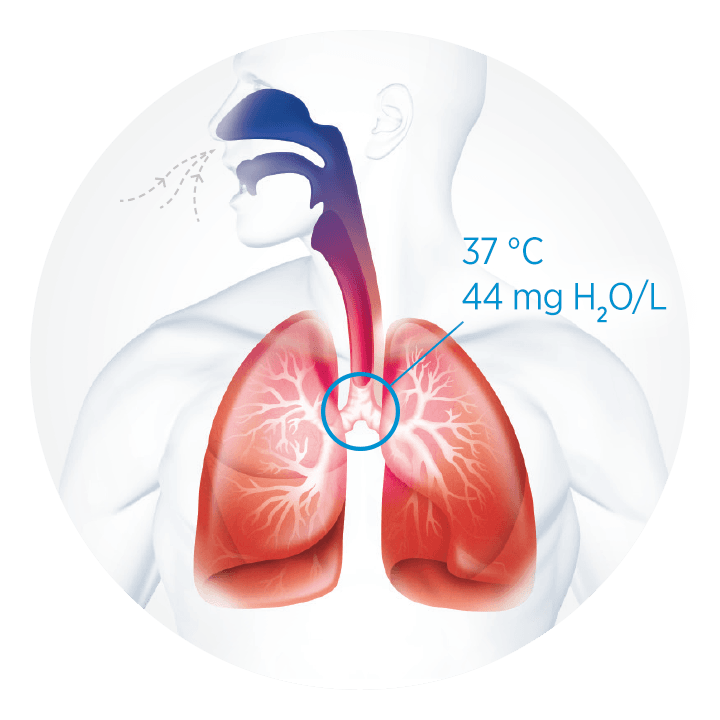 The respiratory system is a highly balanced 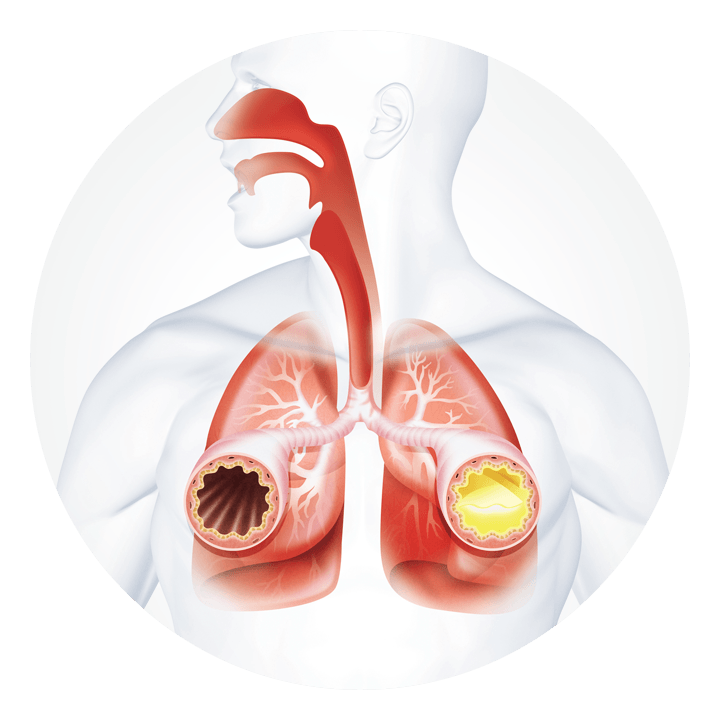 Normal vs. occluded airway |
- Rochwerg B, Brochard L, Elliott MW, Hess D, Hill NS, Nava S, et al. Official ERS/ATS clinical practice guidelines: noninvasive ventilation for acute respiratory failure. Eur Respir J. 2017 Aug;50(2):1602426.
- Popat B, Jones AT. Invasive and non-invasive mechanical ventilation. Medicine (Baltimore). 2012 Jun;40(6):298–304.
- Restrepo RD, Walsh BK. AARC Clinical Practice Guideline. Humidification during invasive and noninvasive mechanical ventilation: 2012. Respir Care. 2012 May;57(5):782–8.
- Williams RB, Rankin N, Smith T, Galler D, Seakins P. Relationship between the humidity and temperature of inspired gas and the function of airway mucosa. Crit Care Med. 1996 Nov;24(11):1920–9.
- Ingelstedt S. Studies on the conditioning of air in the respiratory tract. Acta Oto-Laryngologica Suppl 130. 1956;3–80.
- Branson RD. Preventing Moisture Loss from Intubated Patients. Clin Pulm Med. 2000 Jul;7(4):187–98.
- Branson, R. D. & Gentile, M. A. Is humidification always necessary during noninvasive ventilation in the hospital? Respir Care 55, 209–216 (2010).
- Nava S, Navalesi P, Gregoretti C. Interfaces and humidification for noninvasive mechanical ventilation. Respir Care. 2009 Jan;54(1):71–84.
- Branson RD. Humidification of respired gases during mechanical ventilation: mechanical considerations. Respir Care Clin N Am. 2006 Jun;12(2):253–61.
- Rea H, McAuley S, Jayaram L, Garrett J, Hockey H, Storey L, et al. The clinical utility of long-term humidification therapy in chronic airway disease. Respir Med. 2010 Apr;104(4):525–33.
- Hasani A, Chapman TH, McCool D, Smith RE, Dilworth JP, Agnew JE. Domiciliary humidification improves lung mucociliary clearance in patients with bronchiectasis. Chron Respir Dis. 2008;5(2):81–6.
- Belli S, Prince I, Savio G, Paracchini E, Cattaneo D, Bianchi M, Masocco F, Bellanti MT, Balbi B. Airway Clearance Techniques: The Right Choice for the Right Patient. Front Med (Lausanne). 2021 Feb 4;8:544826. doi: 10.3389/fmed.2021.544826.
- Branson RD. Secretion management in the mechanically ventilated patient. Respir Care. 2007 Oct;52(10):1327–8.
- Branson RD. The effects of inadequate humidity. Respir Care Clin N Am. 1998 Jun;4(2):199-214.
